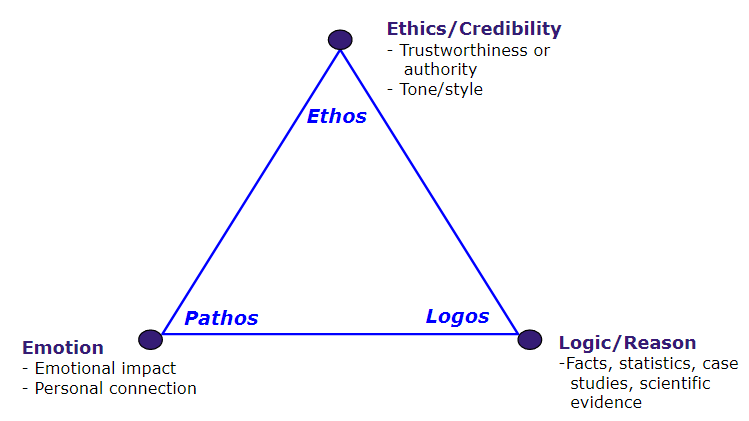What Is An Appeal In Writing
Skip to content
Determining Your Audience and Purpose
Appealing to Your Audience

Once you know who your intended audience is and what your purpose is for writing, you can make specific decisions about how to shape your message. No matter what, you want your audience to stick around long enough to read your whole piece. How do you manage this magic trick? Easy. You appeal to them. You get to know what sparks their interest, what makes them curious, and what makes them feel understood. The one and only Aristotle provided us with three ways to appeal to an audience, and they're called logos, pathos, andethos. You'll learn more about each appeal in the discussion below, but the relationship between these three appeals is also often calledthe rhetorical triangle, and in diagram form, it looks like this:

Pathos
Latin for emotion, pathos is the fastest way to get your audience's attention. People tend to have emotional responses before their brains kick in and tell them to knock it off. Be careful though. Too much pathos can make your audience feel emotionally manipulated or angry because they're also looking for the facts to support whatever emotional claims you might be making so they know they can trust you.
Logos
Latin for logic, logos is where those facts come in. Your audience will question the validity of your claims; the opinions you share in your writing need to be supported using science, statistics, expert perspective, and other types of logic. However, if you only rely on logos, your writing might become dry and boring, so even this should be balanced with other appeals.
Ethos
Latin for ethics, ethos is what you do to prove to your audience that you can be trusted, that you are a credible source of information. (See logos.) It's also what you do to assure them that they are good people who want to do the right thing. This is especially important when writing an argument to an audience who disagrees with you. It's much easier to encourage a disagreeable audience to listen to your point of view if you have convinced them that you respect their opinion and that you have established credibility through the use of logos and pathos, which show that you know the topic on an intellectual and personal level.
Below is a video (found at https://youtu.be/uiDVaVEAKqU) about rhetorical appeals that goes into more detail about the three appeals and how Aristotle used the rhetorical triangle to illustrate the relationship between the appeals and the audience.
For more on appealing to your audience, also see Imagining Your Audience's Needs, in the "Prewriting: Generating Ideas" section of the text.
What Is An Appeal In Writing
Source: https://openoregon.pressbooks.pub/wrd/chapter/appealing-to-your-audience/
Posted by: gidleyanxiortampt.blogspot.com

0 Response to "What Is An Appeal In Writing"
Post a Comment